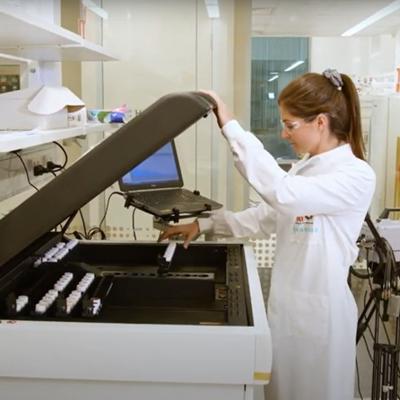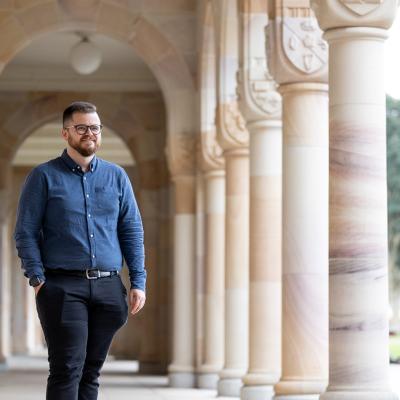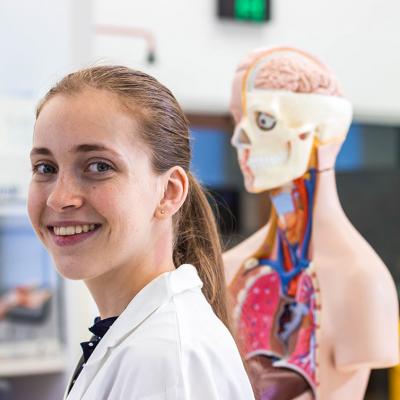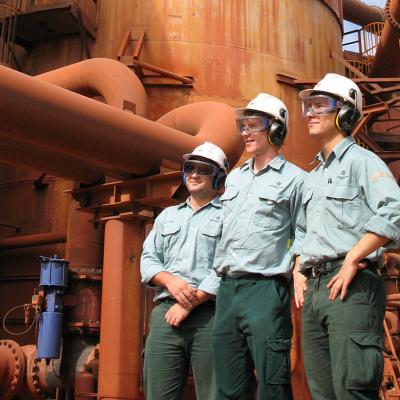Considering studying biomedical engineering at university? You may have lots of questions. We’re here to help you find answers.
- What types of subjects do you study in biomedical engineering at uni?
- What degree do you need to be a biomedical engineer?
- What jobs can I get with a biomedical engineering degree?
- Should I study biomedical engineering?
We've interviewed a UQ graduate to find out. Talia Rose studied a Bachelor of Engineering (Honours) / Science at UQ and since graduating in 2018, has worked at an NGO, a university and a startup company. She now works for Brisbane-based biotechnology company Vaxxas, where she is a senior medical device engineer.
Talia’s here to answer some of your questions so you can find out what it’s like to study biomedical engineering at UQ, get a sneak peek into some of the skills you’ll learn and gain an understanding of what you can expect from this type of degree.
Let's find out if biomedical engineering sounds like the study area for you.
Is biomedical engineering fun?
One of the really fun things about studying biomedical engineering is getting to learn about cutting-edge innovation that is actively improving the lives of patients. Understanding the impact your field of work can have on people’s lives is a real motivator.
Biomedical engineering, like lots of engineering disciplines, includes significant hands-on design work at university. These experiences designing and building things in the laboratory can be a lot of fun.
How hard is biomedical engineering?
I found the electrical engineering element of my degree the most challenging, so that is probably the area I had to spend the most time studying. It is hard to compare between other areas of study that I don’t have experience in, but engineering is certainly a challenging degree.
Is biomedical science harder than engineering?
I personally found the engineering component of my dual degree more difficult than the science component, but that is just personal preference. I found my science subjects involved much more memorising of key content, while engineering required more problem solving and applications.
One thing I liked about studying a dual degree was that I felt my science and engineering courses were very different, so it was nice to switch between studying them.
Currently studying high school subjects in science and maths to prepare for university? Get study tips from recent high school graduates to help you ace your ATAR subjects.
What's the workload like for a biomedical engineering student?
The workload is fairly significant, as both engineering and science have a number of lab and in-person components. I had approximately 20-25 face-to-face contact hours each work (lectures, labs, workshops, seminars), and it was generally expected that for every hour you spend in class, you would spend 1-2 hours outside of that studying as well. So, I was at university 5 days a week, and also studied most weekends.
Having said that, your time is much more flexible than at school! I could study at uni from 8am-12pm, but then work a 3-hour shift in the afternoon, and then go back for class and further study in the evening.
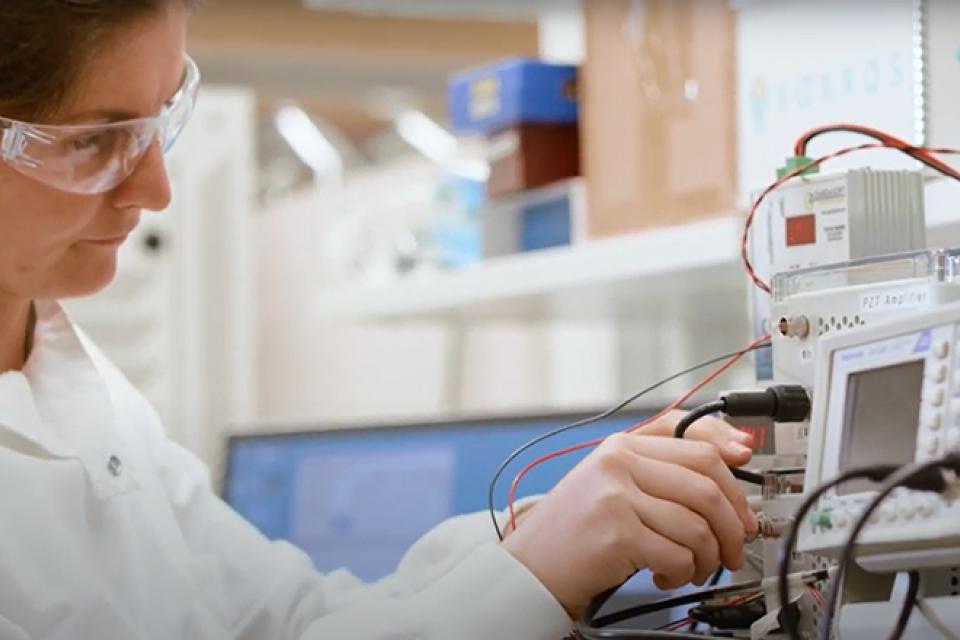
How do you become a biomedical engineer?
I studied a Bachelor of Engineering (Honours) with a dual major in biomedical and electrical engineering, as well as a Bachelor of Science, majoring in biomedical science.
The most common way to study biomedical engineering at UQ is via the Bachelor of Engineering (Honours). Out of the 6 specialisations you can choose to study in this program, the chemical, electrical and mechanical engineering specialisations all offer a biomedical engineering major.
If, like Talia, you want to combine the Bachelor of Engineering (Honours) with another degree, UQ offers 10 dual degrees pairing this program with bachelors in arts, biotechnology, computer science and design, to name a few.
What kind of subjects do you study in biomedical engineering?
Does biomedical engineering require math?
Studying biomedical engineering certainly requires you to take courses in maths. Maths is a requirement in the first 2 years of an engineering degree, and you then use those skills in subsequent engineering classes throughout the remainder of your degree. Once you graduate, you could be working in an engineering role which requires a high level of maths daily, but there are also plenty of engineering roles that don’t require that.
Does biomedical engineering require physics?
I needed to take both physics and chemistry courses in my first year of uni to progress to further courses in my degree. Depending on what type of engineering you are looking to study, there are different compulsory courses.
Depending on the role you take on after graduating, you could be using physics and chemistry every day, or not too much at all. There's definitely jobs available in both of those categories!
What’s the most unexpected thing you learned while studying at UQ?
I expected engineering to have a lot of right and wrong answers – a lot of black and white, mathematical-based problem solving. While that is a big part of engineering, UQ also introduced me to engineering assumptions, justification, and judgement.
There is seldom a correct or incorrect answer in the design work that I do in industry. UQ gave me a lot of the skills and tools necessary to critically analyse a problem and rationalise a solution that will work for a specific context and constraints.
How did being a part of UQ’s Women in Engineering program help you during your studies and beyond?
The Women in Engineering program introduced me to a fabulous network of engineering peers. The program spans all engineering disciplines at UQ, which allowed me to meet students studying other disciplines to my own. It was fantastic to connect with women who studied different technical content, but often shared similar challenges to my own.
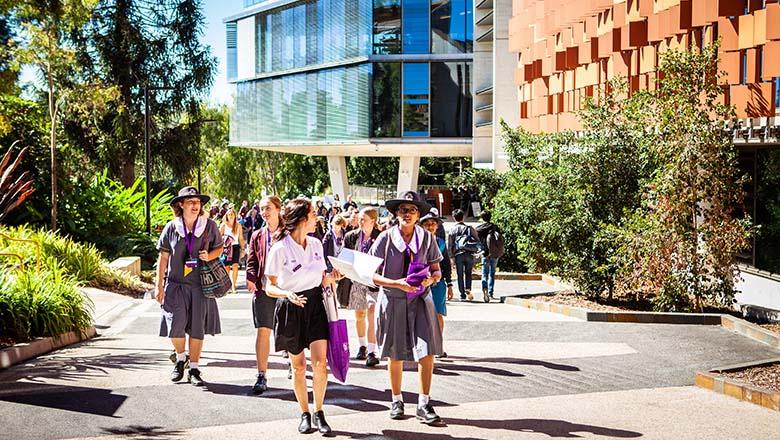
UQ Women in Engineering frequently organise events, including fun hands-on workshops for high school students interested in studying engineering at university.
What other extracurricular activities did you get involved in during your studies and what would you recommend to commencing students?
I would strongly encourage anyone thinking of studying engineering to get involved in engineering clubs and societies. Now 5 years into industry, the largest projects I have individually managed were when I was a student executive.
I was the president of the UQ Engineers Without Borders Student Chapter for a number of years while I was at UQ. It gave me fantastic exposure to project management and industry connections, as well as an opportunity to improve my own skills in leadership.
I’d also highly recommend UQ’s social sports competitions – I still play sport at UQ to this day!
What can you do with a biomedical engineering degree?
One of the coolest things about biomedical engineering is the breadth of possibilities it opens you up to. Medical engineers can work in industry or in research, in hospitals or in labs.
I have previously worked in medical device repair in Cambodia and Nepal. In this role, I was coordinating programs that repaired medical equipment located in hospitals.
I now work in Brisbane and have been in R&D (research and development) and design roles as part of a team creating innovative technology that has never existed before!
Explore the Bachelor of Engineering (Honours) majoring in biomedical engineering or discover what it's really like to study other programs at UQ.



